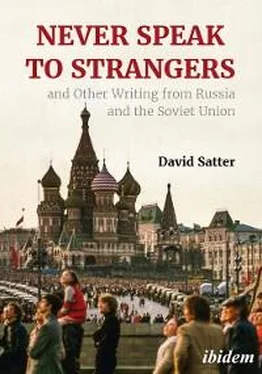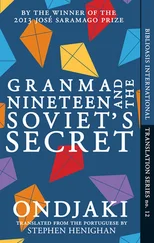The present campaign against dissent, which is only the latest of a series dating from the late 1960s, began with the seizure of Alexander Ginzburg in February 1977 outside a pay telephone booth near his wife’s apartment. It grew out of a basic feature of Soviet life, the Soviet desire to make solemn international human rights commitments without loosening the State’s total control.
The Soviet authorities signed the Helsinki accords aware that they could not honour them. With their formation of the Helsinki agreement monitoring group in May 1976, the dissidents accepted the implicit challenge to hold the authorities to their word.
The arrest of more than 20 members of “Helsinki” groups in Moscow, the Ukraine, Lithuania, Georgia, and Armenia in the last year and a half and the sentencing of 16 of them has deprived the movement of its most effective leaders but has far from destroyed it.
On July 16, the day after Anatoly Shcharansky was sentenced, remaining Moscow dissidents crowded into the apartment of Dr. Andrei Sakharov, the Nobel Peace Prize winner, to reiterate their determination and announce the appointment of a new member of the Moscow-based Helsinki Group, Professor Sergei Polikanoff, a nuclear physicist and corresponding member of the Soviet Academy of Sciences. Professor Polikanoff said he was joining the group in light of recent “significant losses” and would contribute to its work in any way he could.
The disparity between the freedoms the Government professes to guarantee and those it actually grants is typical of the Soviet Union. The authorities make human rights commitments because they want to attribute the apparent unanimity of Soviet society to Marxist development rather than to the absence of freedom. Unanimity in the Soviet Union, exemplified perhaps in the Supreme Soviet, which may be the world’s only parliament never to have voted no, is always held to be voluntary.
Soviet authorities may thus ignore ostensible rights and freedoms but can never disavow them. When two dissidents went to the Moscow City Council last year to say that they planned to hold a demonstration in Pushkin Square to mark United Nations Human Rights Day, they were not told that such a demonstration would he illegal, but merely advised that if hooligans from nearby cafes decided to beat them up, it would be exclusively their fault.
The atmosphere of unreality which this situation creates is part of the life here and limits the extent to which the dissidents, who always attempt to take human rights commitments literally, can pressure the authorities to honour the rights the authorities have themselves promulgated.
When, however, the Soviet Union signed the Helsinki agreements in which it derived tangible benefits such as Western agreement to the European territorial status quo in exchange for specific Soviet undertaking on human rights, the situation changed. If the West was serious about compliance, the Western powers would need information about Soviet violations which only the dissidents could supply and, for the first time, the dissidents would have a directly concerned external ally.
The crackdown on dissent, which has been unprecedentedly thorough has often been depicted as a response to President Carter’s human rights campaign. In fact, the interrogations and searches which are normal preparations for arrest, began before President Carter assumed office and the authorities would have almost certainly acted to suppress the Helsinki group regardless of who had been in the White House.
The Soviet Union was born of a successful conspiracy and perhaps acting out of unconscious memory, the authorities immediately suppress any form of independent organisation. This is in no way surprising. The Communist Party’s dominance of all organisational life—political, religious or cultural—means there is a social vacuum in the Soviet Union which would immediately draw in a wide range of discontented elements were it allowed to be utilised.
The Helsinki group, in the eight months during which it operated freely, established a network of contacts all over the country, and began receiving an enormous volume of mail. If allowed to exist, it could have become an institutionalised internal opposition with wide sources of information and important foreign contacts.
President Carter’s human rights campaign far from inspiring the arrests, may actually have helped the dissidents in the long run, by emphasising to the Soviet leader the continuing outside interest in the dissidents’ fate.
The international reaction to persecution of dissidents for attempting to exercise rights officially endorsed by the Soviet Government and generally acknowledged to be basic to human dignity, sets limits on Soviet behaviour the system would never generate itself. There will be no protest demonstrations in Red Square if Dr. Sakharov is arrested but the Soviet authorities must consider what would happen outside the country and to the Soviet Union’s prestige.
Part of the reason the Soviet Union signs international human rights agreements in the first place is because it wants international respectability. The Soviets will probably continue to sign such documents if, for no other reason, out of a reluctance to disqualify themselves as suitable signatories.
What the Soviet authorities may not fully realise is that the rest of the world, which does not accept the Soviet definition of the individual as without political rights before the State, will probably continue to react. The continuance of mendacious political trials backed by the full authority of the Soviet State is likely, therefore, to be a source of tension between Russia and the West for years to come.
It may be hoped, however, that, the dissidents’ selfless activities—so apparently fruitless—may over time and with the help of this Western reaction be a source of pressure on the Soviet Union to become less closed and rigid.
International Conference Trento, Friday/Saturday, December 6–7, 2002
Soviet Dissent and the Cold War
During the Cold War, the secret that the Soviet Union sought to hide from the West was its fundamentally ideological character. Although the Soviet system was animated by the drive to change human nature and remake reality, the Soviet Union depicted itself as a democracy that differed from Western democracies only in the population’s extraordinary degree of unanimity.
The Soviet Union boasted an array of supposedly democratic institutions—trade unions, courts, a parliament and a press. Faced with this democratic façade, it was often easiest for Western representatives to treat the Soviet Union, if not as a democracy, then at least as a country whose motives were those of any great power. The ideological underpinning of the Soviet state was frequently ignored.
In this context, the Soviet dissidents were important because they spoiled the mirage of voluntary unanimity that the Soviet regime took pains to construct. Because of their dedication and bravery (and the repression that their courage inspired), the democratic façade of the Soviet Union was discredited and the ideological nature of the East-West confrontation because impossible to conceal.
The Soviet dissident movement during the Cold War had an important effect on both the Soviet Union and the West.
In the case of the West, the dissident movement acted to push Western societies toward attention to first principles, even unwillingly.
The first effect of the dissident movement was its impact on Western public opinion. The emergence of protest within the Soviet Union demonstrated to many in the West that the surface calm of Soviet society was misleading. Soviet leaders continued to speak about the "total political and ideological unity of the Soviet people" but due to the activities of the dissidents, this claim became increasingly hollow.
Читать дальше












